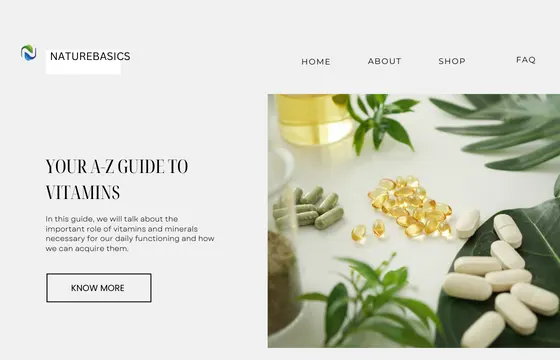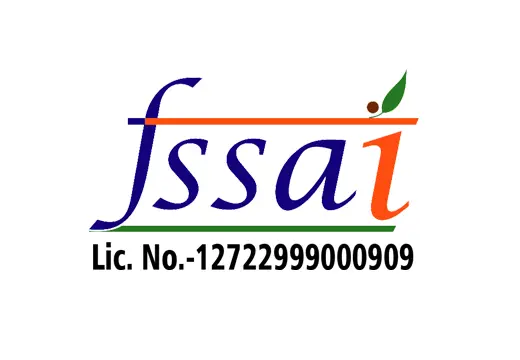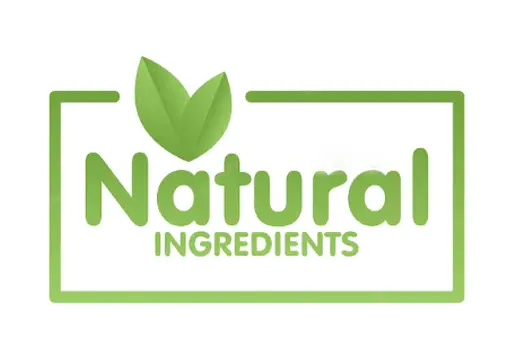The Power of Nutrition: A-Z Guide to the Essential Vitamins and Minerals
Posted on 05 Jun, 2023

The Power of Nutrition: A-Z Guide to the Essential Vitamins and Minerals
In addition to the macronutrients we get from food, our bodies also need a number of micronutrients to function smoothly and keep us healthy. These micronutrients are not produced by our body itself and must be supplied through food or supplements.
If we regularly eat a balanced diet with plenty of fruits, vegetables, whole grains, legumes, and healthy fats and proteins, we can meet our needs without a multivitamin. However, due to our busy and modern lifestyles, this is not always possible. In this case, turning to a reliable supplement can be a good option.
Vitamins are necessary for energy production, the immune system, normal cell function, growth and development. Minerals, on the other hand, are important for bone health, healing and the utilization of nutrients in the body.
In this guide, we will talk about the important role of vitamins and minerals necessary for our daily functioning and how we can acquire them.
Here is a list of vitamins and minerals we need daily:
- Vitamin A
- Vitamin B complex
- Vitamin C
- Vitamin D
- Vitamin E
- Vitamin K
- Calcium
- Iodine
- Iron
1. Vitamin A
Vitamin A, most commonly known as retinol, has been a hot topic in the skin care industry lately. It is a fat-soluble vitamin that is found in many foods and plays an important role in the
- it plays an important role in the natural defence against diseases and infections and keeps the immune system functioning properly,
- it keeps the skin healthy
- it supports vision in the dark.
Fun Facts: It is called retinol because of the pigment it produces in the retina of the eye.
Sources of Vitamin A
Both plant and animal are sources of vitamin A.
Among animal sources, beef liver, fatty fish, cheese, dairy products, and eggs are good sources of the vitamin. Among plant sources, vegetables high in beta-carotene are considered good sources of vitamin A. These include broccoli, beet, lettuce and the famous carrots. Not only do they improve night vision, but they also help convert retinol, which the skin needs.
Symptoms of vitamin A deficiency
- Night blindness
- Dry eyes
- Inflamed, dry skin
- Infections of the throat
- Delayed growth in children
- Acne and breakouts
2. Vitamin B and folic acid
B Vitamins include vitamin B1, B2, B3, B5, B6, B7, B12, folate and folic acid. These vitamins are important for
- the breakdown of carbohydrates
- for supplying the body with nutrients
- help red blood cells formation
- maintenance of healthy skin and brain cells and other vital body tissues.
Sources of vitamin B and folic acid
Milk, cheese, eggs, red meat, fish such as tuna and salmon are animal sources of the vitamin B complex. For plant sources, dark green leafy vegetables such as spinach and kale are good sources. Fruits like bananas and watermelon, and Whole grains, beans like kidney beans and chickpeas, tempeh, are also rich in vitamin B complex. An all-around vitamin B12 supplement can also help your body function smoothly.
Symptoms of Vitamin B deficiency
If you make sure you eat a balanced diet every day, most foods will provide your body with the amount of vitamin B it needs. However, certain medications or diets can cause a deficiency. Here are the symptoms your body may show in such cases:
- Scaly skin or rashes
- Swollen tongue
- Abdominal cramps
- Anemia
- Constipation
- Feeling of tingling or numbness in hands and feet
- Confusion, irritability or depression
Vitamin C /ascorbic acid is an important antioxidant. It is necessary for
- the development, growth and repair tissues of the body
- neutralizing free radicals
- improves iron absorption
- Heals wounds
- strengthens our immune system.
Sources of Vitamin C
It is common knowledge that all citrus fruits contain sufficient vitamin C. You can also opt for natural vitamin C tablets if you are unable to meet the requirement through diet alone. Here are some dietary sources:
- Bell peppers
- Broccoli
- Brussels sprouts
- Potatoes
- Bell peppers
Symptoms of vitamin C deficiency
Common symptoms of vitamin C deficiency include:
- Muscle and joint pain
- Unexplained weight loss or gain
- Fatigue and irritability
- Rough, dry skin
- Weak immunity
4. Vitamin D
Vitamin D is a fat-soluble vitamin that is essential for keeping our bones, teeth and muscles healthy.
Vitamin D has the following benefits:
- it helps regulate phosphate and calcium
- fights infections
- reduces inflammations.
- helps regulate mood and reduces signs of depression.
- Thank you to its fat-soluble property, it also plays a role in regulating kidney function and treating kidney disease.
Sources of vitamin D
The best source of vitamin D is sunlight, as the body makes vitamin D through direct exposure to sunlight. However, the timing of sun exposure also plays an important role. In India, sunlight exposure between 11 am and 2 pm promotes vitamin D production in the skin.
Natural sources of vitamin D can also be taken through multivitamin supplements. Here are some other sources of vitamin D from food.
- Canned tuna
- Cod liver oil
- Egg yolks
- Mushrooms
- Fortified foods
Symptoms of vitamin D deficiency
- Lower immunity
- Weaker bones and muscles
- High blood pressure
- Feeling hungrier than usual
- Frequent mood swings
- Constant fatigue
5. Vitamin E
Vitamin E is also a fat-soluble vitamin. It is stored in fatty tissue and in the liver and helps
- the body to fight free radical damage. It also
- helps red blood cells formation
- acts as a vasodilator, preventing blood clotting and providing smoother blood flow.
- It helps to ensure that cells can perform their important functions.
Sources of vitamin E
Vitamin E is a group of compounds found in a variety of fatty foods. These include:
- Vegetable oils such as canola, olive, sunflower, corn, wheat germ and soybean oils
- Nuts such as almonds and peanuts
- Foods such as red peppers, squash and spinach
- Fruits like mango, kiwi and blackberries
Symptoms of vitamin E deficiency
- Difficulty walking or with muscle coordination
- Visual distortions or disturbances
- Muscle weakness and pain
- General fatigue and weak immunity
6. Vitamin K
Vitamin K helps the liver produce proteins that help blood clot. In simple words, it helps prevent excessive internal and external bleeding. Most adults get enough of this vitamin from their diet, and deficiency is also quite rare.
Sources of vitamin K
- Green leafy vegetables such as lettuce, cabbage, spinach and kale
- Grains
- Soybeans and chickpeas
- Green tea
- Vegetable oils
- Some meat and dairy products, such as cheese, liver, and eggs
Symptoms of vitamin K deficiency
Although vitamin K deficiency is rare in adults, it can occur in some people who take medications that block the metabolic function of the vitamin. In these cases, the following symptoms can be observed:
- Prolonged time for blood clotting
- Excessive bleeding during menstruation
- Hemorrhage
Vitamin toxicity
Vitamin toxicity is when a vitamin is present in the body in excessive amounts. It is caused primarily by fat-soluble vitamins, such as vitamin A and vitamin D, because they are stored in the body longer than water-soluble vitamins. It can be caused by high doses of supplements or high consumption of highly fortified foods. It can be easily avoided by monitoring intake of multivitamin supplements based on deficiencies or gaps in the diet.
Calcium
Calcium is required for healthy bones and teeth, calcium plays a role in blood clotting, just like vitamin K. It also helps regulate muscle contractions, which include heartbeat, and nerve function. It keeps the tissues in our body strong and stiff to help us move normally.
Sources of Calcium
- Milk, cheese, and similar dairy foods
- Okra
- Spinach
- Figs
- Soybeans
- Calcium-fortified foods
Symptoms of Calcium deficiency
- Calcium deficiency, hypocalcemia, can show up as:
- Muscle cramps
- Feeling of Numbness and tingling in feet and hands
- Weak and brittle nails
- Confusion of memory loss
- Easy fracturing of bones/weaker bones
Iodine
The body needs the mineral iodine to produce thyroid hormones. Thyroid hormones control metabolism and other important functions. Thyroid hormones are also important for proper bone function and brain development during pregnancy. Since the human body cannot produce iodine itself, it must be obtained from the diet.
Sources of Iodine
- Sea fish
- Shellfish
- Eggs
- Cow milk and other dairy products
Symptoms of Iodine deficiency
- Swelling of thyroid glands
- Visible lump on your neck
- Thinning hair
- Dry skin
- Feeling colder than usual
- Slowed heart rate
Iron
Iron is an important mineral for the formation of red blood cells. Red blood cells carry oxygen and help our muscles to store and use oxygen.
Sources of Iron
Heme and non-heme iron
Heme is found in animal flesh like
- Meat and red meat
- Poultry and seafood
- Dried apricot
- Soybean flour
- Kidney beans
- Chickpeas
- Nuts
Symptoms of iron deficiency
- Extreme fatigue
- Lightheadedness
- Pale skin
- Shortness of breath
- Dry and damaged hair and skin
Conclusion
Sources of various vitamins and minerals are easy to find in nature, but they can be present in much smaller amounts than our bodies need. To make sure we get the right amount of nutrients, a healthy balance of organic, natural sources and clean supplements is a good way to go






